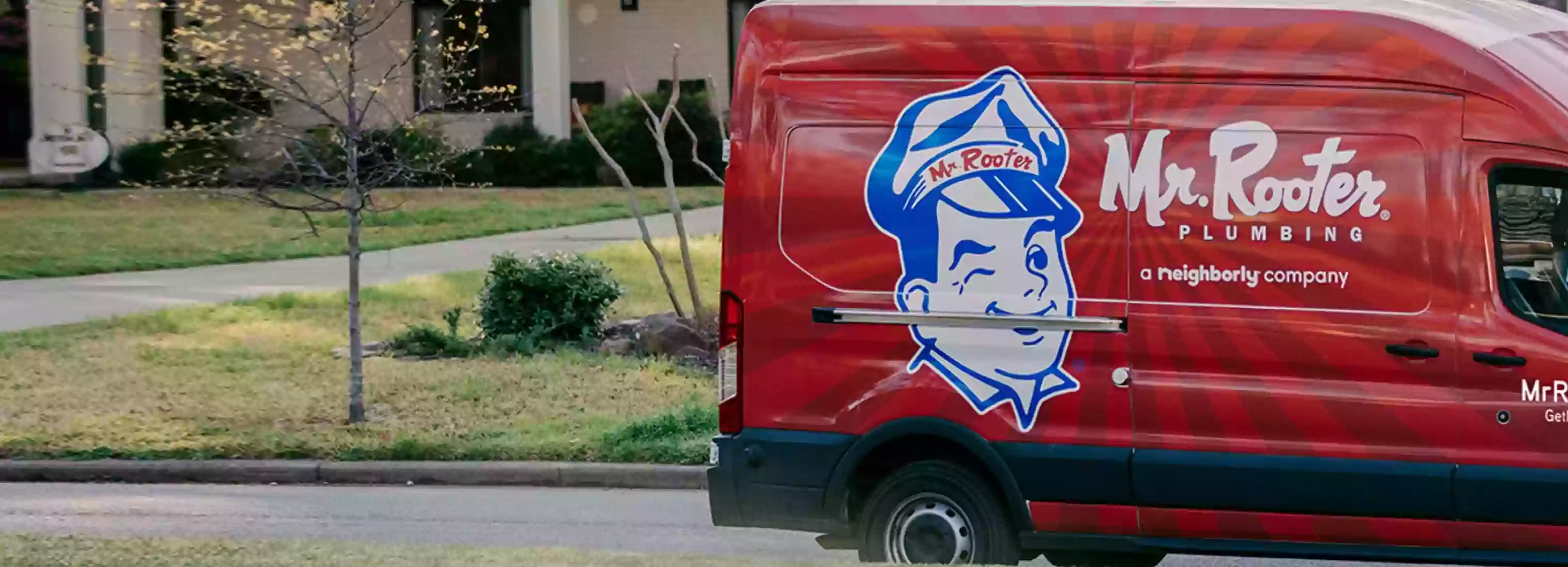14 Common Plumbing Problems and How To Fix Them
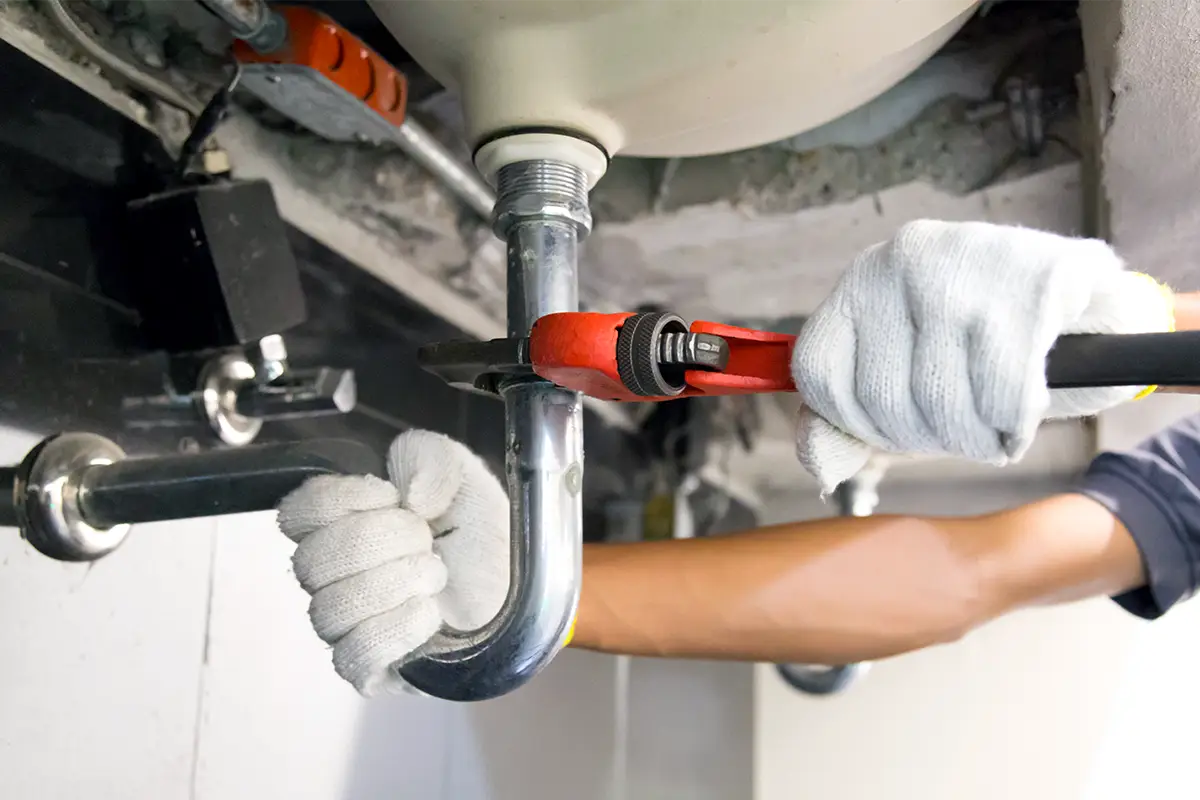
|
Quick answer: 14 common plumbing problems include:
|
Whether your home is old or new, homeownership always comes with some uncertainty — including plumbing problems. Whether it’s a leaky faucet, a clogged drain, or a plumbing emergency, understanding common plumbing issues can help you take the appropriate action when needed.
This guide will explore 14 of the most common plumbing problems homeowners may encounter. We’ll share tips for quick fixes and several ways to get expert help for more complex challenges.
Table of Contents:
What To Do in a Plumbing Emergency
Fix Plumbing Problems With Mr. Rooter Plumbing
14 Common Plumbing Problems
Plumbing issues at home can run the gamut from minor leaks to burst pipes. Newer homes are naturally more resilient, but complications can arise within 10 to 15 years. We’ve gathered 14 common plumbing problems you'll likely encounter over time.
1. Clogged pipes
There are a variety of things that could cause pipes to get clogged — even the environment. Roots from nearby trees and an accumulation of minerals can compromise pipes in your system.
Some of the worst plumbing problems stem from improper installation or neglect by home builders. If some or all of the homes in your community were constructed by the same builder, check with neighbors to see if they are experiencing similar issues.
This is just one reason why it’s so important to get a plumbing inspection before you agree to buy a home — even a newer home. A thorough inspection could save you a lot of money in the long run.
The Fix: You may be able to unclog your pipes with a drain snake if the issue isn’t too complex. If the blockage is severe, it’s best to call a service professional to repair your pipes.
2. Blocked drains
Hair, grease, debris, tree roots, and leaves may lead to blocked drains on your property. If you have a well water system, wastewater could accumulate and slowly poison your water supply, impacting drainage areas in and around your home.
Even if the blockage doesn’t result in a toxic buildup, a blocked drain could affect the structural integrity of your home. Seepage from a blocked drain could easily compromise your foundation or promote mold growth.
The Fix: It’s possible to fix a blocked drain with a plunger and a drain cleaning solution. If the blockage is too great, it's best to call a service professional.
3. Faulty water heater
Water heater problems are sometimes difficult to diagnose. Everything from a faulty internal thermostat and poor installation to a sediment buildup in the tank or a leaky pipe can be the cause of the problem.
The Fix: Water heaters are complex devices that use electricity. For safety reasons, it's important to have a professional perform inspections and repairs instead of attempting to fix it yourself.
4. Leaky faucets
A leaky faucet can happen in nearly any home, regardless of how new the home is. Although a leak may not seem like a big deal, it could easily turn into a plumbing emergency. Those small yet consistent drops of water can add up and increase your water bill considerably.
The Fix: Sometimes a leaky faucet just needs a new handle or O-ring. Your local hardware store likely sells faucet repair kits. If the issue is more problematic, a service professional can repair your faucet for you.
5. Running toilets
Like a leaky faucet, a toilet valve that doesn’t close properly can raise your water bill each month — and waste dozens of gallons of water each day. Although replacing a faulty or damaged flapper in your toilet doesn’t require a lot of expertise, it's a good idea to have a professional check to make sure all the toilets in the home are working properly.
The Fix: A broken fill valve or worn-out flapper could be the cause of your running toilet. Inspect your toilet’s tank; if the water levels aren’t receding, that likely means the flapper isn’t opening properly. If you continue to hear a running water sound, even without flushing, the fill valve may need a replacement.
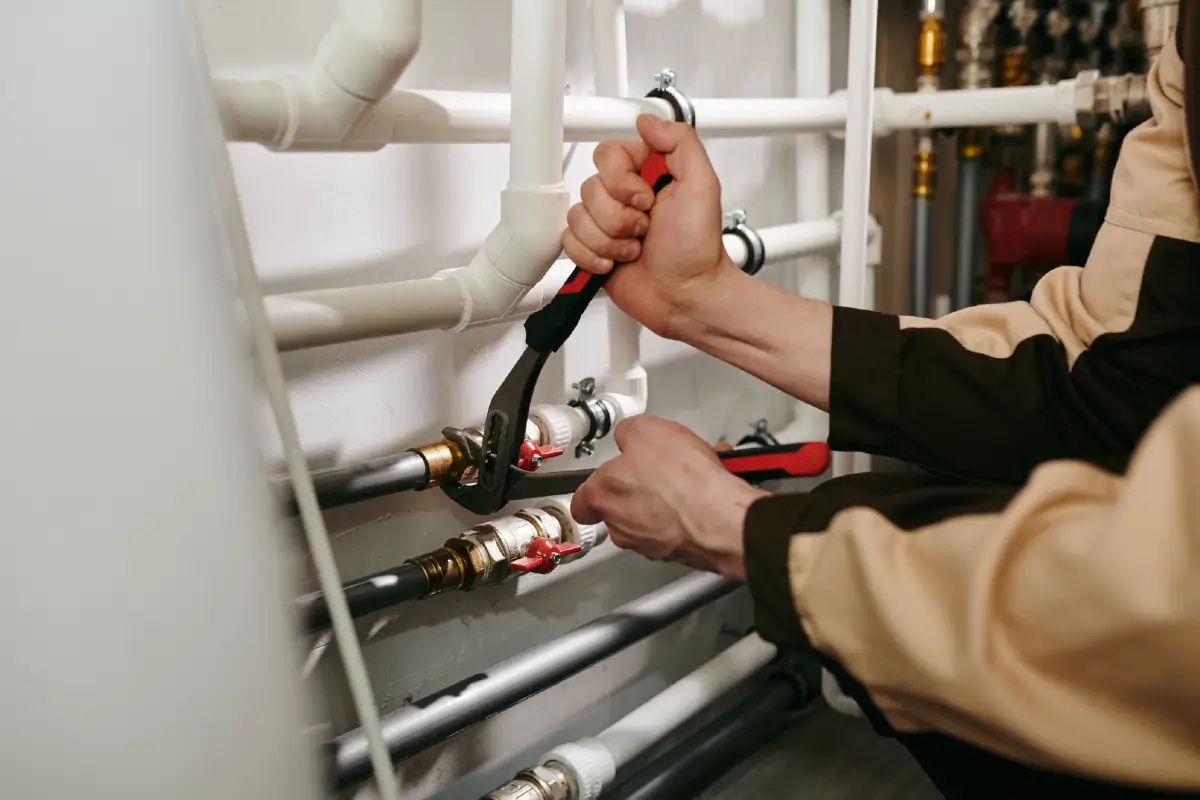
6. Low water Pressure
Low water pressure is a telltale sign of bigger issues in your plumbing system. Blocked drains and leaky pipes can disrupt the water flow, causing water to trickle out of sinks and showers even when your valves are fully opened.
The Fix: Double-check your primary water supply valve first. Sometimes, the valve could simply be turned in the wrong direction. If the issue is more complex, service professionals can help.
7. Clogged Toilet
Toilets can get clogged for many reasons. Minerals like calcium and magnesium can accumulate in your toilet and cause “hard water” to jam your drain line. No matter the cause, a clogged toilet can be extremely disruptive if left untreated.
The Fix: Try unclogging your toilet with a plunger and consider using a drain-clearing solution. If that doesn't work, a professional can fix the problem for you.
8. Dirty water
Dirty water is another signifier of other plumbing problems in your household. You could unexpectedly find muddy water spewing from your sink if there are leaks or breakages in your plumbing system. This isn’t the same as experiencing a backflow inspection, where water might be discolored for several hours at most.
The Fix: Let cold water run for 20 minutes from the affected sources and see if the water color improves. If not, contact a service professional to find and fix the root of the problem.
9. Unusual Water Bills
Excess water usage leads to higher bills, so it’s no surprise you have to pay extra after letting the shower run too long. However, if there are spikes in your monthly bills and you haven’t changed your habits, there could be a larger plumbing problem in your home, like a leak or broken pipe.
The Fix: Contact your utility service provider first to ensure your bill is accurate. Then, call a service professional to fix the root of the problem.
10. Water Line Break or Leak
Water lines connect underground water mains to your home, providing you with water. That’s why low water pressure or poor-quality water are signs of a water line leak.
The Fix: If a water line break occurs in your home, shut off the water first. Take pictures of the problem area, then call a service professional to repair the damage.
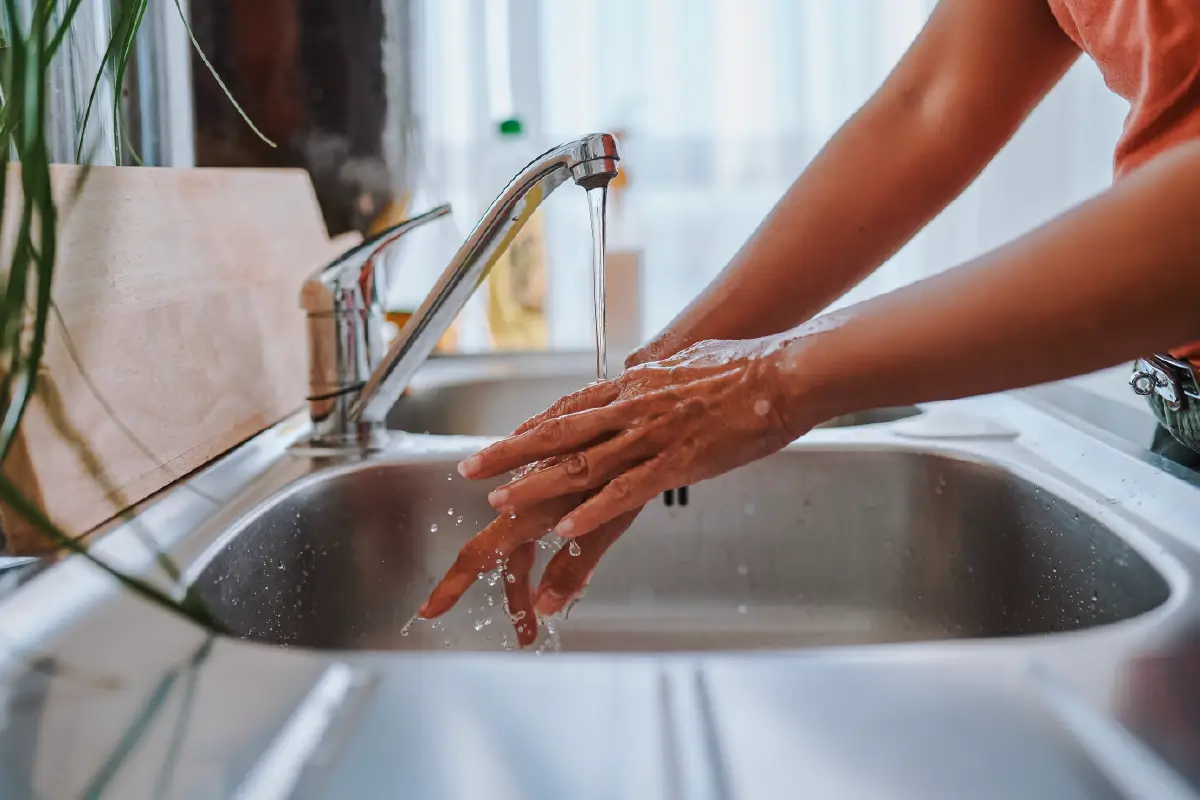
11. Standing Water in Your Yard
Complications with your gutter, downspout or sprinkler system can cause water to pool in your yard. Trash and leaves can occasionally cause blockages, and even spots in your yard can also trap water over time.
The Fix: Standing water can weaken the soil in your yards and even damage your home’s foundation. Fill in any low spots you find in your yard and inspect and clean your yard after experiencing inclement weather.
12. Frozen Pipes
When winter rolls around, many homeowners take action to prevent their pipes from freezing over. Adding more insulation when possible is a great preemptive measure, and the same goes for increasing airflow by opening your cabinets. Frozen pies can burst if left unchecked, which can lead to more extensive water damage in other parts of your home.
The Fix: Insulate and heat up your pipes as much as possible. Hardware stores sell various kinds of insulation wraps at a relatively low price. If your pipes freeze, turn off the water and try to warm them back up with a hair dryer and hot towels.
13. Leaking Hose Bib
You most likely use the hose bib on the side of your home when you connect a hose to water your yard or garden. However, the bib can start leaking due to wear and tear or environmental factors. A leaky bib might start as a slow drip but can very easily begin to stream water over time.
The Fix: Try tightening the packing nut on your hose bib first, then contact a professional if these adjustments don’t work.
14. Gas Leaks
In particular scenarios, a gas leak can occur in tandem with some of the plumbing problems we’ve highlighted, or it can even happen due to natural disasters like earthquakes or tornadoes. Gas leaks are serious health hazards, so this problem needs to be fixed as soon as possible.
The Fix: Gas is extremely hazardous and flammable, and leaks can be difficult to detect without the proper training and equipment. Always leave this one to the professionals.
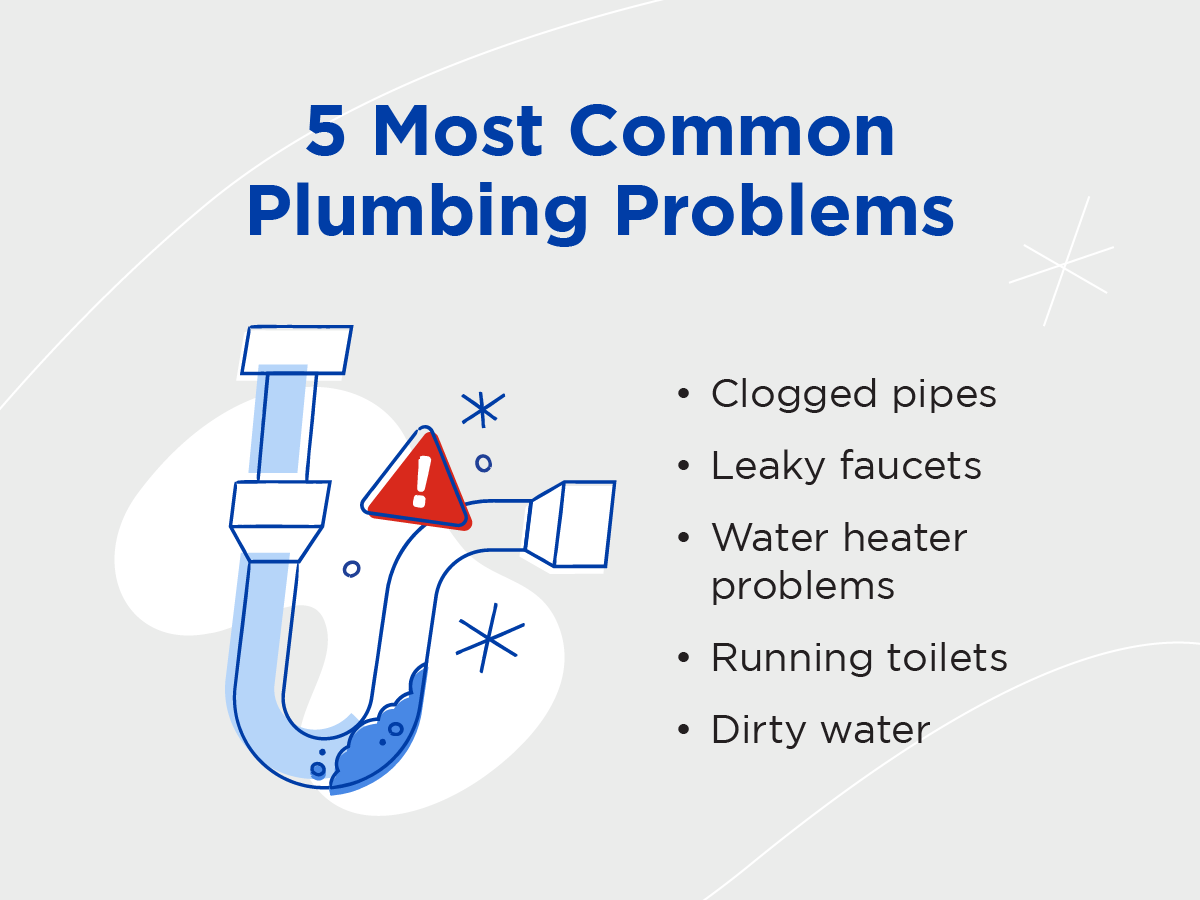
What To Do in a Plumbing Emergency
A plumbing emergency is a serious issue that presents an immediate threat to yourself, your loved ones, or your property. This includes burst pipes, a ceiling collapse, or even flooding.
Three do’s in a plumbing emergency include:
- Do turn off your water supply immediately
- Do contact a service professional like Mr. Rooter Plumbing®
- Do capture photo or video evidence of the damage
Conversely, four don’ts to avoid are:
- Don’t try to fix any major plumbing problems alone
- Don’t leave your fuse box powered on unless necessary
- Don’t disregard the issue, since small leaks can become big problems
- Don’t use harsh chemicals that may damage your pipes and the environment
Plumbing Maintenance Tips
One of the best ways to deal with major plumbing problems is to take a proactive approach. Identifying and addressing an issue before it develops into a major problem will ultimately save you money and a lot of headaches.
Here are several preventative plumbing maintenance tips you can apply to your home:
- Call a service professional if you suspect there’s an issue with your water heater.
- Insulate your pipes when temperatures are low.
- Fill in low spots across your yard.
- Try plunging your toilet before calling a plumber.
- Contact a professional immediately if you find or suspect a gas leak.Routinely perform seasonal plumbing maintenance throughout the year.
Fix Plumbing Problems With Mr. Rooter Plumbing
Mr. Rooter Plumbing can help you tackle existing plumbing problems and avoid a future plumbing emergency with regular maintenance. Request an estimate from your local Mr. Rooter Plumbing for residential plumbing inspections, maintenance, and repairs.
Our service professionals can also help you set up a maintenance schedule that ensures your system works smoothly and efficiently all year round.
 Click to call
Click to call